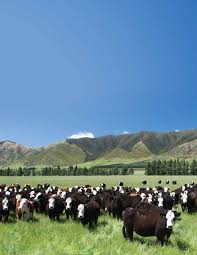THE Global Roundtable for Sustainable Beef (GRSB) has has launched three global sustainability goals, headlined by a commitment to reduce the net global warming impact of beef by 30 percent.
The GRSB describes its global sustainability goals as commitments to advance and improve the sustainability of the global beef value chain.

The three goals are:
Climate: Reduce the net global warming impact of beef by 30 percent by 2030.
Land Use: Ensure the beef value chain is a net positive contributor to nature.
Animal Health and Welfare: Provide cattle with an environment in which they can thrive, achieved through increased adoption of best practices.
(More details on each goal below)
Established by GRSB, the goals will be led and implemented by members of the Roundtable (click here to view the members on the GRSB website)
In a media release announcing the goals this week the GRSB described the commitments as ambitious and essential to ensure that beef solidifies its role as part of a sustainable food system.
“One of the biggest challenges facing the world today is climate change and the global beef industry has a key role to play in mitigating it,” the GRSB statement said.
“Through its worldwide network of members, GRSB intends to power progress in sustainable beef by setting ambitious goals around reducing greenhouse gas emissions, improving land use, and enhancing best practices in animal welfare.
“The three key areas of focus outlined in these goals have been carefully identified to reflect priority areas for advancement and improvement. GRSB’s mission is to ensure that beef maintains a sustainable global supply chain and solidifies its role as part of a sustainable food system.”
The three goals in more detail:
Climate: “Reducing global warming impact on a pathway to climate neutrality. GRSB aims to globally reducing by 30 percent the net global warming impact of each unit of beef by 2030, on a pathway to climate neutrality. In order to support the urgent global ambition of limiting global temperature rises to 1.5 degrees by 2030, GRSB members will implement and incentivise climate smart beef production, processing, and trade, while safeguarding and building upon the carbon stores in soil and landscapes. Reducing atmospheric greenhouse gases requires both emissions reduction and carbon sequestration, making agriculture a key player in positively sequestering carbon in soils – the Intergovernmental Panel on Climate Change (IPCC) estimates that grasslands alone could sequester 54 to 216 million tonnes of carbon annually by 2030. Many GRSB members, including all processers and major retailers and several producer organisations, have already set goals that align with the broader GRSB goal. Roundtable members are also committing to investing in research and development of climatesmart practices, tools, and knowledge. Investment has already been made in areas including detailed analysis of carbon sequestration – members will now look beyond how to manage carbon sequestration and how it can be more effectively measured on an ongoing basis.”
Land Use: “Ensuring the beef value chain is a net positive contributor By 2030, GRSB and its members will ensure the beef value chain is a net positive contributor to nature. The Roundtable’s belief is that sustainable beef production can and should have a net positive impact on nature. In order to achieve this goal, GRSB will work with national and regional roundtables to establish measurement metrics to effectively measure, track, report, and verify progress. Many producers and farmers are already net positive contributors to nature. GRSB members will finance, source, develop, support, and share practices throughout the entire value chain that are designed to sustain and restore grazing lands, enhance resilience, conserve forests, grasslands, and native vegetation, increase biodiversity, and help reverse ecological decline. GRSB is working with its members and key stakeholders to eliminate illegal deforestation and illegal conversion as a priority. Beef farmers and ranchers will have access to greater financing from members within the Roundtable and recognition where no contribution to additional deforestation is made. It is widely recognised that scientific developments will play a huge factor across each goal, hence the investment in research and development. GRSB’s members will encourage adoption of science-based land management practices that will maintain healthier soils, generate additional carbon sequestration, promote efficient water use, and increase biodiversity – protecting flora and fauna.”
Animal Health and Welfare: “Providing cattle with a good quality of life Sustainable beef means providing cattle with an environment in which they can thrive – health and welfare are the major contributors to doing so. GRSB members will focus their efforts on continuing to improve the quality of life for cattle, achieved through increased adoption of best practices in disease prevention, treatment measures, cattle handling, and appropriate genetics. Roundtable members will work together, and alongside beef farmers and ranchers, to encourage continuous learning and adoption of best practices across the beef supply chain that will improve welfare, and increase the ability of cattle to thrive in accordance with the World Organisation for Animal Health. Increasing training opportunities by 25% based on 2020 levels will help ensure responsible practices, such as ensuring comfort, allowing animals to express normal patterns of behaviour, and pain mitigation, are implemented. GRSB members will develop or adopt practical tracking of the effectiveness of the training, while continuing to focus their efforts on minimising morbidity and mortality with measurable improvements for each. All value chain partners, from farm to plate, will be encouraged to support and invest in the continuous improvement of cattle’s health and wellbeing.”
 Ruaraidh Petre (right), Executive Director of the Global Roundtable for Sustainable Beef, said: “The world relies on beef and the industry relies on a healthy world to produce it. That’s why there is growing momentum in the industry to protect and nurture the earth’s natural resources.
Ruaraidh Petre (right), Executive Director of the Global Roundtable for Sustainable Beef, said: “The world relies on beef and the industry relies on a healthy world to produce it. That’s why there is growing momentum in the industry to protect and nurture the earth’s natural resources.
“The conversation around beef sustainability is more important now than ever, and we recognise the need for beef to be more environmentally sound, more socially responsible, and more economically viable.
“The goals which we have launched today are a commitment from the global beef industry, articulating the role and responsibility that we are taking together towards achieving a more sustainable ecosystem.
“Our goals are ambitious, and we may not yet have all the solutions to achieve them. By focusing our efforts, we aim to inspire research and investment in science and innovation that will unlock their potential impact.”
Cherie Copithorne-Barnes, fourth generation rancher and Director at The Calgary Stampede, said: “Beef is not only part of a vital food system, but a hundred-billion-dollar industry that supports farmers, ranchers, families and communities in almost every country all around the world.
“Much is already being done to preserve grasslands, adopt regenerative practices, protect forests, enhance carbon sequestration, and optimise resources, but there is strong recognition of the need and opportunity to do more.
“The Global Roundtable for Sustainable Beef is a worldwide network of the people and organisations leading this positive change, and these goals represent our aim to safeguard the natural world.”
Source: GRSB

Please, keep me posted and welcome to cooperate from LATAM.
Best,
JM
By talking about “climate neutrality”, GRSB is doing the Australian beef industry a big favour.
Talking “climate neutrality” is repositioning the debate away from the CN30 (carbon neutral by 2030) position that is based on the false assumption that methane is a “stock gas” when it is actually a “flow gas”.
“Climate neutrality” is talking about not changing “the net balance of greenhouse gases” through running cattle, which is very different to what CN30 has committed to.
Ongoing stable methane emissions from cattle does not change the net balance of greenhouse gases i.e. stable cattle methane emissions do not change the climate. This provides a good reason for why GRSB has shifted the debate to “climate neutrality”. When it is said that there is a need to limit temp change to 1.5 – 2 degrees change, this is the same as saying we need to achieve climate neutrality within these limits.
The profile of Australia’s cattle methane emissions over time confirms that we are not changing the net balance of greenhouse gases from this aspect. But there are other greenhouse gases we are responsible for, such as NO2 and CO2. Coming back to achieving “climate neutrality”, Australian producers only need to offset these two greenhouse gases to achieve “climate neutrality”. Cattle methane is only a problem with the CN30 commitment.
In the event that there is an increase in Australia’s methane emissions over stable emissions, there is an equation for offsetting these extra emissions. One tonne of carbon stored in the landscape, above or below ground, will offset one kg of methane emissions forever (this equation is documented in a peer reviewed paper in an International Greenhouse Journal and is not disputed).
The increased methane over stable emissions would be due to increased cattle numbers ,which in turn would likely be due to better pasture management. It is reasonable to assume that better pasture management will result in more carbon stored in the paddock which will be offsetting increased methane.
Global warming, that GRSB refers to, as part of their climate statement, is driven by a change in the net balance of greenhouse gases. Stopping global warming is the same as achieving climate neutrality.
When all the points above are taken into consideration, a 30% reduction on the path to “climate neutrality” by 2030, as proposed by GRSB, is much more realistic and doable than the CN30 commitment which simply can’t be achieved.
It seems that Alan Lauder has very correctly explained that the simple solution is to grow more grass. It might be better for us to focus on grass rather than have another institution to tell us all what to do?
GRSB pushing political BS based on false narratives.